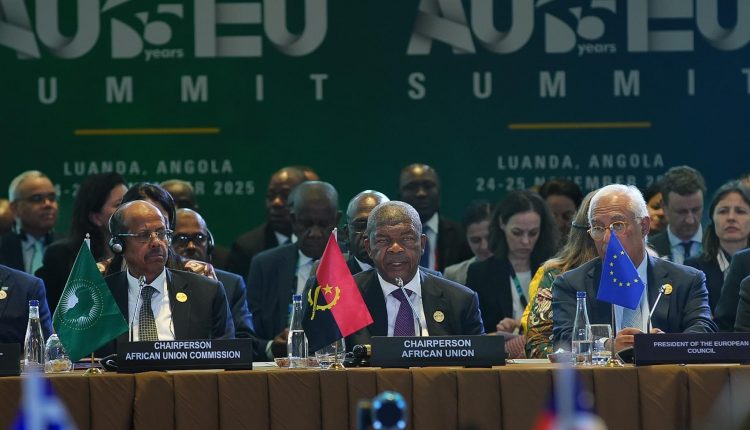AU Chair Urges Europe to Remove Bureaucratic Barriers Slowing Joint Development Projects
Addis Ababa, November 25, 2025 (FMC) — João Manuel Gonçalves Lourenço, President of the Republic of Angola and Chairperson of the African Union, on Monday called on Europe to remove bureaucratic barriers and accelerate cooperation on joint development projects, emphasizing that streamlined partnerships are essential to Africa’s economic transformation.
The remarks came during his opening statement at the 7th African Union–European Union Summit, which began yesterday afternoon in Luanda, Angola.
The summit brought together African and European Heads of State, senior officials, and delegations to discuss priorities under the theme “Promoting Peace and Prosperity through Effective Multilateralism.”
Lourenço highlighted that Africa possesses abundant natural resources, fertile land, vast waterways, abundant sunshine, and a young workforce, all of which, combined with European know-how and technology, can drive industrialization, infrastructure development, and economic integration.
He underscored the continent’s need for practical cooperation free from bureaucratic delays that often slow critical joint projects.
Stressing youth empowerment, he called for vocational and technical training to equip young Africans with skills necessary to participate in implementing continental projects and meet labor demands for European and other investors.
He also highlighted the urgent need for affordable financing, equitable access to global capital markets, debt restructuring mechanisms, and innovative instruments to support large-scale initiatives, including electrification, mobility, industrialization, and climate resilience.
The President cited ongoing initiatives such as the Global Gateway framework, the Lobito Corridor, and other infrastructure projects aimed at boosting agriculture, industrial production, regional trade, and the African Continental Free Trade Area as areas where cooperation must be intensified.
He called for European investment in Africa’s structural projects, digital connectivity, energy transition, and mineral transformation.
Lourenço further emphasized Africa’s role in combating climate change, urging investment in clean energy, hydro and solar power, reforestation, sustainable household energy, and the fight against desertification caused by deforestation and other human activity.
He stressed that Africa, while contributing the least greenhouse gas emissions, can play a major role in global climate solutions if adequately supported.
On global security, the President noted multiple crises affecting Europe, Africa, and the Middle East, including the conflict in Ukraine, conflicts in Sudan, the Sahel, Somalia, Mozambique, Madagascar, and the Israeli-Palestinian situation in Gaza.
He highlighted that violations of the United Nations Charter and international law by major powers exacerbate instability worldwide. He called for a restoration of multilateralism rooted in equality, respect for sovereignty, and adherence to universally accepted principles.
Concluding his address, Lourenço stressed that Africa and Europe must strengthen mutual exchanges, cooperate pragmatically, and leverage their respective strengths to achieve shared prosperity.
He underlined that removing bureaucratic constraints, increasing investment, and promoting fair global governance are essential for realizing the full potential of the AU-EU partnership.

